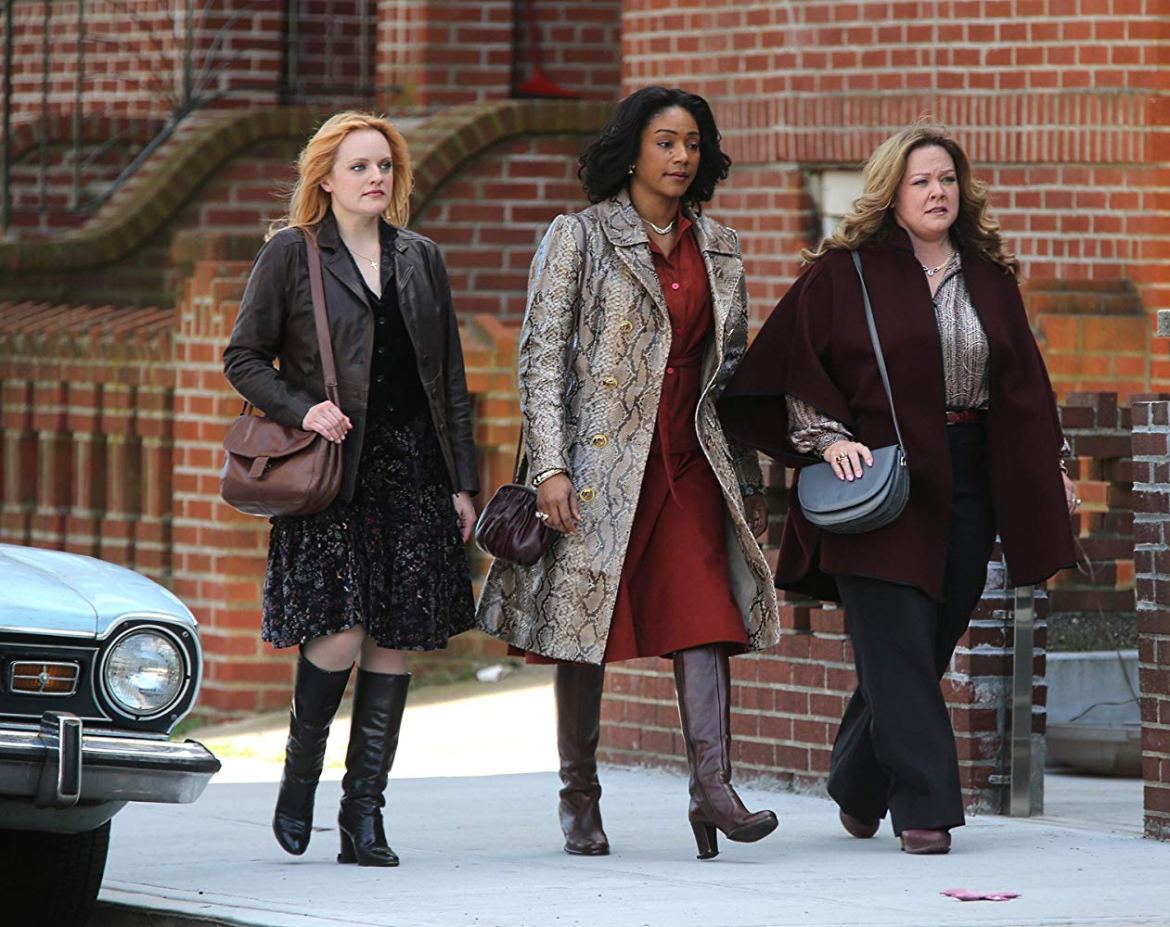
We know Hollywood isn’t creative. More times than not their idea of progress extends as far as taking a specific film and gender-swapping it. In the case of Andrea Berloff’s The Kitchen, an adaptation of the DC/Vertigo graphic novel of the same name, it is an entire male dominated genre that’s examined through a female lens to emotionally resonant effect. The Kitchen is like a Scorsese movie, if he actually focused on women. It’s a statement that does have its flaws, but they’re far outweighed by the trio of spectacular performances, gorgeous cinematography, and a biting examination of sexism not just in the Mafia but throughout history.
New York’s Hell’s Kitchen in 1978 is still under the thumb of the Irish Mafia, though the tide is turning. When the husbands of Kathy (Melissa McCarthy), Ruby (Tiffany Haddish), and Claire (Elisabeth Moss) are sent to prison after attempting to rob a convenience store, they assume “the Family” will take care of them. Instead, the trio struggle to make ends meet. Instead of playing up to the men, the group decides to fix the mob (and their community) themselves.
In her directorial debut Andrea Berloff creates a film that’s fun, affecting, and intense. The influences are obvious because the mobster movie has been done to death, yet Berloff’s script seeks to examine the relational intricacies of the Mafia, the stories we don’t see. In this case, the mob wives left to fend for themselves. Each woman is highly different, with the actress perfectly reflecting each individual personality. Melissa McCarthy’s Kathy is kind, a mother to two children. When things get tough she bakes cookies, an attempt to kill with kindness. Claire, played with a quiet beauty that belies an inner menace by Moss, is a battered wife who understands she’s weak. Tiffany Haddish’s Ruby is who’s truly interesting, a Black woman who married into the Mob. It’s apparent she’s faced racism, on top of her husband’s cruelty.
As Kathy says, these women are never meant to rise above “having babies,” yet despite the Mob touting its family ethos, it’s a scam. When Kathy and Ruby kindly ask for more money to keep themselves alive, they’re told to take what’s given to them with a thank you. Berloff’s script, at times, reads like a guidebook to the things women have had to say to avoid being assaulted, to try to get a job, to merely exist in the world. Each woman finds their own power through taking over the crime family, understanding why men fight so hard to stay on top.
Berloff’s influences are obvious, and it’s difficult not to see the Scorsese of it all. Needle drops are prominent and do become a taste overbearing, but if you aren’t given Marty crap for it you can’t do so here. Legendary cinematographer Maryse Alberti truly captures a film that feels as comfortable in the ’70s as it does in 2019. What’s amazing is watching the whole thing in 2019 as it calls not only on elements happening within the late ’70s, but the movies themselves. Remember, movies of the late ’70s were still embracing women as part of second-wave feminism. Had The Kitchen been released in 1988, there’s no doubt these women would have acted differently.
And like Berloff’s other work, something like Straight Outta Compton, she creates characters who are unrepentant. Deaths are gruesome and straightforward, characters can turn on a dime. But at its core it’s about the interactions between the three leads who are spellbinding. Haddish is the MVP, and though I’d easily see where women of color could consider her arc problematic, I found it empowering and relatable. Make no mistake, The Kitchen proves the Oscar talk around her was no fluke. She’s flat-out Best Actress material.
McCarthy is right behind her, taking her mild-mannered mom character and having to endure some serious trials and tribulations. The weakest link is Moss who, in spite of having a great character turn and fantastic chemistry with Domnhall Gleeson, doesn’t grip onto the frame like her co-stars. Kudos also have to go out to Annabella Sciorra whose moments in this movie are pure joy. Every line sounds like an F-you to a certain someone.
Honestly, I can see people turning away from The Kitchen because of how female dominated it is, and that would prove its point. The Kitchen is about the legacy of women having to clean up men’s messes. They aren’t perfect, but they make a hell of an attempt. By the end I was left emotional, galvanized to take on the world, and that’s what matters. The Kitchen is flat-out wonderful!


